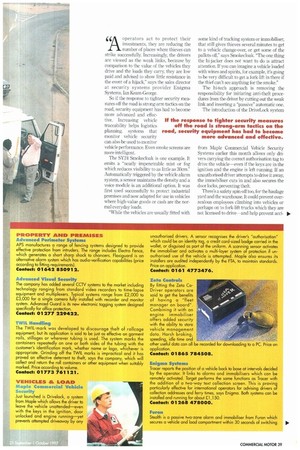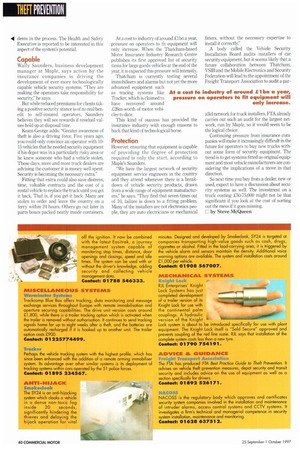‘4 operators act to protect their
Page 41

Page 42

If you've noticed an error in this article please click here to report it so we can fix it.
investments, they are reducing the number of places where thieves on strike successfully. Increasingly, the drivers are viewed as the weak links, because by comparison to the value of the vehicles they drive and the loads they carry, they are low paid and advised to show little resistance in the event of a hijack," says the sales director at security systems provider Enigma Systems, Ian Keam-George.
So if the response to tighter security measures off the road is strong-arm tactics on the road, security equipment has had to become more advanced and effective. Increasing vehicle traceability helps logistics planning. systems that monitor vehicle security can also be used to monitor vehicle performance. Even smoke screens are more intelligent.
The SY24 Smokecloak is one example. It emits a "nearly impenetrable mist or fog which reduces visibility to as little as 30cm." Automatically triggered by the vehicle alarm system, a sensor maintains the density and a voice module is an additional option. It was first used successfully to protect industrial premises and now adapted for use in vehicles where high-value goods or cash are the normal everyday loads.
"While the vehicles are usually fitted with some kind of tracking system or immobiliser, that still gives thieves several minutes to get to a vehicle change-over, or get some of the pallets off," says Smokecloak. "The one thing the hi-jacker does not want to do is attract attention. If you can imagine a vehicle loaded with wines and spirits, for example, it's going to be very difficult to get a fork-lift in there if the thief can't see anything for the smoke."
The hi-tech approach is removing the responsibility for initiating anti-theft procedures from the driver by cutting out the weak link and inserting a "passive" automatic one.
The introduction of the DriveLock system from Maple Commercial Vehicle Security Systems earlier this month allows only drivers carrying the correct authorisation tag to drive the vehicle—even if the keys are in the ignition and the engine is left running. If an unauthorised driver attempts to drive it away, the immobiliser cuts in and also secures the door locks, preventing theft.
There's a safety spin-off too, for the haulage yard and the warehouse. It could prevent overzealous employees climbing into vehicles or perhaps on to fork-lift trucks which they are not licensed to drive—and help prevent acci 411 dents in the process. The Health and Safety Executive is reported to be interested in this aspect of the system's potential.
Capable
Wally Saunders, business development manager at Maple, says action by the insurance companies is driving the development of ever more technologically capable vehicle security systems. "They are making the operators take responsibility for security," he says.
But while reduced premiums for clients taking a positive security stance is of no real benefit to self-insured operators, Saunders believes they will see rewards if residual values hold up at disposal time.
Keam-George adds: "Greater awareness of theft is also a driving force. Five years ago, you could only convince an operator with 1015 vehicles that he needed security equipment if his depot was in a particularly risky area or he knew someone who had a vehicle stolen. These days, more and more truck dealers are advising the customer it is money well spent. Security is becoming the necessary extra."
Fitting that extra could also save distress, time, valuable contracts and the cost of a rental vehicle to replace the truck until you get it back. That is, if you get it back. Many are stolen to order and leave the country on a ferry within 24 hours. Others go out later in parts boxes packed neatly inside containers. At a cost to industry of around Llbn a year, pressure on operators to fit equipment will only increase. When the Thatcham-based Motor Insurance Industry Research Centre publishes its first approved list of security items for large goods vehicles at the end of the year, it is expected this pressure will intensify.
Thatcham is currently testing several immobilisers and alarms but not yet the more advanced equipment such as tracing systems like Tracker, which is claimed to have recovered around £26m-worth of motor vehicles to date.
This kind of success has provided the insurance industry with enough reasons to back that kind of technological horse.
Protection
However, ensuring that equipment is capable of providing the degree of protection required is only the start, according to Maple's Saunders.
"We have the largest network of security equipment service engineers in the country and they attend whenever there is a breakdown of vehicle security products, drawn from a wide range of equipment manufacturers," he says. "They find that seven times out of 10, failure is down to a fitting problem. Many of the installers are not electronics people, they are auto electricians or mechanical fitters, without the necessary expertise to install it correctly."
A body called the Vehiole Security Installation Board audits installers of car security equipment, but it seems likely that a future collaboration between Thatcham, VSIB and the Mobile Electronics and Security Federation will lead to the appointment of the Freight Transport Association to audit a par allel network for truck installers. ETA already carries out such an audit for the largest network, run by Maple, so it would seem to be the logical choice.
Continuing pressure from insurance companies will make it increasingly difficult in the future for operators to buy new trucks without some form of security equipment. The trend is to get systems fitted as original equipment and most vehicle manufacturers are considering the implications of a move in that direction.
So next time you buy from a dealer, new or used, expect to have a discussion about security systems as well. The investment on a truck costing L50-75,000 might not be that significant if you look at the cost of sorting out the mess if it goes missing.
T. by Steve McQueen
















































































































